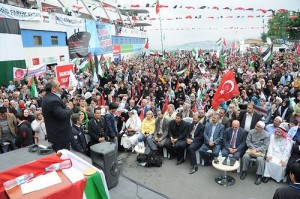Tuesday
Jun012010
Blaming the Gaza Flotilla: Text of US Remarks in Security Council
 Tuesday, June 1, 2010 at 6:46
Tuesday, June 1, 2010 at 6:46  The statement by Ambassador Alejandro Wolff, Deputy Permanent U.S. Representative to the United Nations, at the Emergency Session of the Security Council yesterday.
The statement by Ambassador Alejandro Wolff, Deputy Permanent U.S. Representative to the United Nations, at the Emergency Session of the Security Council yesterday.My reading? While expressing concern over the deaths, Washington is ensuring that it cannot be accused of blaming Israel for the event. Note also that the US Government is not supporting an independent inquiry but leaving it in the hands of Western Jerusalem.
Perhaps most striking is the implication of fault in Wolf's second paragraph with its reference to "non-provocative and non-confrontational mechanisms" for aid to Gaza.
In other words, the Freedom Flotilla --- just by sailing --- brought about this situation:
The United States is deeply disturbed by the recent violence and regrets the tragic loss of life and injuries suffered among those involved in the incident last night aboard the Gaza-bound ships. We are working to ascertain the facts. We expect a credible and transparent investigation and strongly urge the Israeli government to investigate the incident fully.
As I stated in the Chamber in December 2008, when we were confronted by a similar situation, mechanisms exist for the transfer of humanitarian assistance to Gaza by member states and groups that want to do so. These non-provocative and non-confrontational mechanisms should be the ones used for the benefit of all those in Gaza. Direct delivery by sea is neither appropriate nor responsible, and certainly not effective, under the circumstances.
The United States remains deeply concerned by the suffering of civilians in Gaza, and the deterioration of the situation there, including the humanitarian and human rights situation. We continue to believe the situation is unsustainable and is not in the interests of any of those concerned. We will continue to engage the Israelis on a daily basis to expand the scope and type of goods allowed into Gaza to address the full range of the population’s humanitarian and recovery needs. Hamas’ interference with international assistance shipments and the work of nongovernmental organizations complicates efforts in Gaza. Its continued arms smuggling and commitment to terrorism undermines security and prosperity for Palestinians and Israelis alike.
We will continue to work closely with the Government of Israel and the Palestinian Authority, along with international NGOs and the UN, to provide adequate access for humanitarian goods, including reconstruction materials, through the border crossings, while bearing in mind the Government of Israel’s legitimate security concerns.
Ultimately, this incident underscores the need to move ahead quickly with negotiations that can lead to a comprehensive peace in the region. The only viable solution to the Israeli-Palestinian conflict is an agreement, negotiated between the parties, that ends the occupation that began in 1967 and fulfills the aspirations of both parties for independent homelands through two states for two peoples, Israel and an independent, contiguous, and viable state of Palestine, living side by side in peace and security. We call again on our international partners –-- both inside and outside this Council –-- to promote an atmosphere of cooperation between the parties and throughout the entire region.

